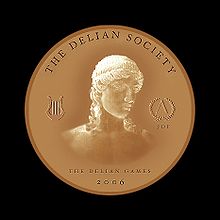- Delian Society
-
The Delian Society, conceived by American composer Joseph Dillon Ford, was founded on 23 January 2004 as an international community of composers, performers, scholars, recording engineers, music publishers, and amateurs dedicated to the revitalization of the great tonal traditions in art music. The Society takes its name from the Greek Island of Delos, legendary birthplace of Apollo, god of music and light.
Among the composers and artists holding membership in the Delian Society are the following:
- Michael Conway Baker
- Elisabetta Brusa
- Jean Chatillon
- Joseph Dillon Ford
- Edward Gold
- John Kenneth Graham
- Anthony Linden Jones
- Warren Park
- Setrak Setrakian
- Gene Ward Smith
- Roman Turovsky-Savchuk
- Grant Colburn
The members of the Delian Society are committed to the creation, performance, study, and worldwide dissemination of new tonal art music in various forms and styles; collaborative support of artists working in other media who revisit and revalidate the great pre-modernist traditions of their respective disciplines; acknowledgement of outstanding contributions to tonal music through a noncompetitive awards program; and publication of relevant articles, reviews, program notes, and other writings.
Composer members of the Delian Society contribute new tonal music to the annual Delian Suite, a collaborative work created every May during the Delian Games and published online. They also are responsible for the world's first virtual new music festival, Nu Mu(sic!) Unlimited (31 October 2006), in which tonal composers and their non-tonal counterparts exchange roles. Those members who demonstrate outstanding support for the work of the Society are honored each year by election to the Order of the Cynthian Palm.
The Delian Society advocates freedom of musical expression, and although some of its members have expressed opposition to non-tonal music, others compose both tonal and non-tonal works. The Delian Society represents a movement away from twentieth-century modernism, whose advocates sought to break with the past and focus on novel, generally non-tonal forms of musical expression. As such, the aesthetic orientation of Delian composers, to the extent that they collectively embrace tonality as a means of ensuring intelligible musical communication, reflects the historicism evident in other art forms of the late twentieth and early twenty-first centuries.
External links
The following official site link provides details about most current members of the Delian Society and links to other relevant web pages of interest:
See also
References
- Colburn, Grant. 2007. "A New Baroque Revival." Early Music America 13, no. 2 (Summer): 36-45, 54-55.
- Smith, Rukshana. 2004. *"Q&A with Joseph Dillon Ford about the Delian Society," Artists without Frontiers Magazine.
Categories:- Music organizations based in the United States
- Contemporary music organizations
- Historicist composers
- Delos
Wikimedia Foundation. 2010.

